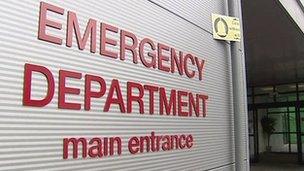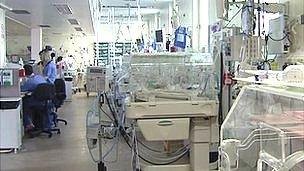Belfast Health Trust boss optimistic special measures ending
- Published
The chief executive of the Belfast Health Trust says he's optimistic that special measures will be lifted in July.

Two people died while waiting in the RVH A&E department
The health minister imposed the measures after two waiting patients died in the Royal Victoria Hospital's A&E department and three babies died in the pseudomonas outbreak.
The babies died at the Royal Jubilee Maternity's neonatal unit.
A fourth baby died in Altnagelvin Hospital in the Western Health Trust.
There was a public outcry following the death of a 77 year old man who died on a hospital trolley while waiting in the emergency department at the Royal Victoria Hospital. He suffered from motor neurone disease.
Encouraged
The family of a female cancer patient also complained to the trust about their mother's treatment. She died before being admitted to the Royal Victoria Hospital's admissions ward in January.
In response, Edwin Poots said in April, he would be introducing the special measures to ensure greater accountability within the Belfast trust.
Addressing the trust board, the chief executive, Colm Donaghy said following a meeting with the department's permanent secretary and the Chief Medical Officer he was encouraged that the measures would be lifted.
"Depending on the minister having confidence to do that - the special measures could be lifted as soon as possible - perhaps in July."
Another meeting is scheduled with the Department of Health on the 12 June.
Mr Donaghy said that he had asked staff to look on the special measures as an opportunity to reassure patients, clients and their families that the trust is delivering a safe, good quality service.
He acknowledged that there had been some very sad outcomes for some patients.
Lack of communication
"The vast majority of those in the trust's care received a service that compares very well with other parts of the UK."
An independent review into the pseudomonas outbreak, said the Belfast Health Trust should have declared it sooner and criticised a lack of communication between health officials across the health service.

Neonatal units in Northern Ireland hospitals underwent a deep clean during the pseudomonas outbreak
In April, Mr Poots said: "The trust will be asked to draw up an action plan specifically focused on those areas where I have been concerned, and I will expect the trust to report on progress against this plan regularly to my department."
This will include the implementation of recommendations which come from the interim report of the Independent Review of Incidents of Pseudomonas Aeruginosa Infection in Neonatal units in Northern Ireland.
For the first time, the special measures were recognised as the minister calling for greater accountability within the health service.
Mr Donaghy told the Trust Board that the first 15 recommendations of the interim report have now been fully implemented. Meanwhile the trust is putting together a robust action plan with regards to the other 17 recommendations within the final report.
Advice
Meanwhile a report into the deaths of the two patients awaiting admission highlights a number of failings.
The trust's medical director, Dr Tony Stevens said a number of lessons had been learned including ensuring that senior medical staff are available late in the evening to ensure junior staff have support.
As reported by the BBC shortly after the 77 year old man's death - an autopsy wasn't carried out.
Tony Stevens told the trust's board, that management was now taking advice from the coroner about how best to contact the office when a death within the emergency department takes place.
The trust has also been advised to improve how they communicate information to the families.
Record keeping should also be tackled to ensure that relevant information is included in handovers between shifts.
- Published5 April 2012
- Published15 March 2012